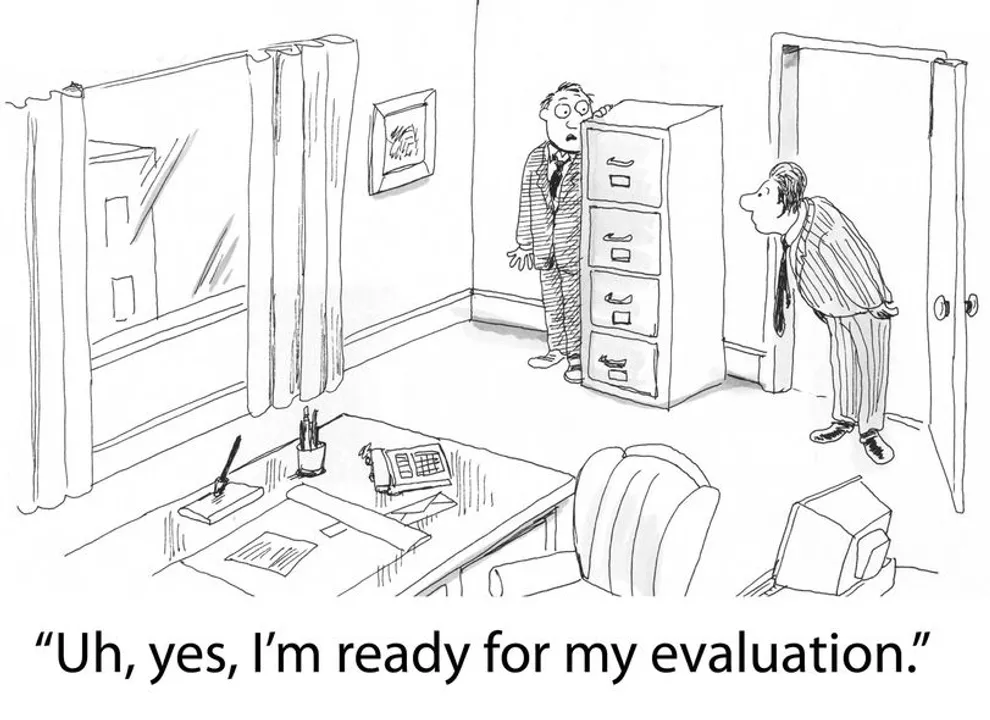How to Handle a Poor Performance Review

123RF.com/pixelliebe
Ah, the dreaded performance review. Even if you love your job and feel like you’re rocking it every day, you know there will be SOMETHING negative there. I mean, they HAVE to add something for you to improve upon, right? But, what if your performance review turns out to be really, REALLY bad? Should you cry? Argue? Demand that it be changed? Grab your fish and storm out of the office in Jerry Maguire fashion? Well, let’s see…
First, as I’ve mentioned, each of us must remember that every performance review is basically required to have something for you to improve upon. Even if it was not required, it would be a little crazy to think that we are so perfect that there would be zero negative remarks noted. Keep this in mind and prepare yourself for what is to come. Be ready to give a diplomatic response as you listen to what management has to say and commit to improving upon whatever they ask of you. Keep a copy of your review for next year and be ready to talk about what improvements you’ve already made!
Now, if you’re unfortunate enough to be faced with a poor review, even if it’s REALLY bad, you do have options. The first option is not necessarily what I recommend, but for some, it might be right. You could quit. Yes, I said it. Quit your job. I want to be clear, however, and I hope that you understand that this should be a well thought out decision. Don’t make the decision at the very moment you receive the review. Take the feedback and consider why your review is so poor. Is it possible that you are unhappy in your current position? Are you just showing up out of habit? Are you no longer giving any effort? Maybe this review was the wakeup call you needed! Maybe it’s time to explore new options. If you choose this route, be sure to give proper notice and while you won’t be working on improving your feedback for your current position, take some time to consider how you can use what you’ve been told to make a great start at your next job!
For some, a poor performance review seemingly comes out of nowhere. It’s possible that you’re totally shocked by the feedback that you’re receiving. It’s in these instances that some tend to become defensive and begin blaming management. While it’s possible that your boss just doesn’t care for you, it’s unlikely that you’re actually receiving a poor performance review based on personal feelings. Do your best to avoid this type of thinking and consider what is actually being said. Is it possible that you aren’t up to par? Do you need additional training or education? Are there aspects of your position that you don’t understand? If any of these are feasible, consider asking for some re-training! Maybe a day or two of shadowing someone who is a top performer would help. How about attendance at a conference? If your review is truly terrible, consider a full re-start of your work, and you may find that you’ll end up on top next year!

123RF.com/andrewgenn
If you’ve decided against quitting, or if re-training for your position isn’t an option (either on your end, or on management’s end), then it’s time to make some changes! First, take a deep breath and remember that a performance review is constructive feedback and an opportunity to improve upon your work. It doesn’t mean that you’re a terrible person or that you are incapable at your job (unless it actually says that, in which case I would refer you to my previous suggestions). Start by being cooperative and asking questions in the meeting with management. Find out exactly what you’re doing wrong and how to correct it. Then, sleep on it. It’s amazing how a mountain turns into a molehill after you’ve had a good night’s rest. Once you’ve collected your info and had some rest, make a plan for how you will improve upon each point. Be sure to make your plan something that is doable and break it down as much as possible into small, simple tasks. See this example:
My Performance Review Adjustment Plan
| What Needs Improvement | How to Improve | |
| Documentation, details and completeness | Create a checklist of points to remember when documenting. Ask Supervisor to review with me. | |
| After documenting, review checklist to ensure all points are included. | ||
| Ask to meet with supervisor weekly x4 weeks for feedback on improvement in documentation | ||
| Teamwork, participation and cooperation | Reach out daily to at least one other team member to offer assistance. | |
| Join a committee within the organization | ||
| Communicate with the team as a whole, via email rather than speaking with one team member and hoping the word is passed around. |
Understand that your performance review adjustment should not be overwhelming in nature. If you feel that it is, request a time to sit down with your supervisor for assistance in altering your plan to make it more feasible. Most likely, once you’ve nailed it down, the improvements will become habits in just a few weeks/months!
At the end of the day, a performance review (even a bad one) is a forced pause to consider your current position, how you feel about it, and if it’s the right place for you to be. Take it in stride and make your next move with a clear mind and intentional steps in the direction that you want to go. A year from now, you’ll be better for it all, whether you’re enjoying a new career or absolutely rocking the one you have!
Related Posts
